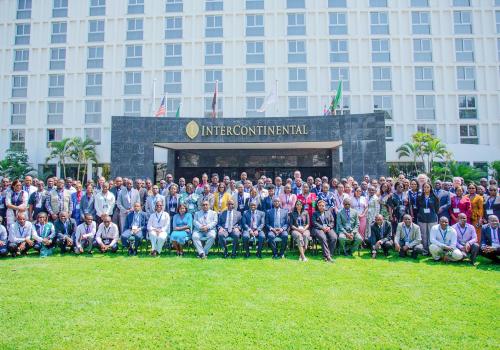The Southern African Development Community (SADC) continues to experience the growing impacts of climate extremes, ranging from devastating floods and cyclones to prolonged droughts that threaten food security and public health. In response to these challenges, more than 30 climate experts and over 200 stakeholders from diverse sectors across the region convened in Lusaka, Zambia, for the 31st Southern Africa Regional Climate Outlook Forum (SARCOF-31).
The four-day forum, held from 8 - 11 September 2025 under the theme “Closing the Early Warning Gap Together within the SADC region,” provided a platform to review last season’s performance, develop a consensus outlook for the upcoming rainfall season, and chart a stronger, more inclusive path toward resilience.
In his keynote address, Dr. Douty Chibamba, Permanent Secretary for the Ministry of Green Economy and Environment of the Republic of Zambia, highlighted the critical need to bridge climate science and policy to strengthen regional resilience. He stressed that climate services must be responsive to the real and immediate impacts of climate change, which are already disrupting agriculture, urban areas, businesses, households, and broader socio-economic development across the SADC region.
Dr. Chibamba further emphasised the importance of enhanced regional cooperation and data sharing, increased investment in meteorological and hydrological services, and the creation of accessible, community-focused climate information delivered in local languages to ensure inclusive and effective adaptation.
He underlined the economic dimension of climate risks. According to the World Meteorological Organization (WMO), Africa is already losing 2–5% of its GDP annually due to climate extremes. Some countries in the region spend up to 9% of their national budgets on emergency responses. This, Dr. Chibamba noted, is not sustainable and also pointed out that many early warning systems remain fragmented, underfunded, and insufficiently people-centered to effectively reach vulnerable communities.
Ms. Mapolao Mokoena, SADC Director of Infrastructure, noted that SARCOF-31 marked the conclusion of the SADC ClimSA Programme, which began at SARCOF-25. She expressed appreciation to the European Union (EU) and partners for their support, while highlighting the forum’s milestone achievements, including the validation of the SADC Multi-Hazard Early Warning System and the draft Regional Multi-Hazard Monitoring Framework. She also stressed the importance of collaboration with the health and media sectors to ensure that climate information is accessible, actionable, and capable of shaping public behaviour.
Other speakers included Dr. Joshua Ngaina, the Acting World Meteorological Organisation Representative for Eastern and Southern Africa / Project Officer for Regional Office for Africa; Mr. Catalin Gherman, Head of Cooperation for the European Union Delegation to Botswana; and Mr. Edson Nkonde, Director of Meteorology for the Republic of Zambia, who urged experts to develop a robust and inclusive early warning framework as a foundation for environmental security in the region.
The forum collectively called for closing gaps in early warning systems, deepening regional cooperation, and ensuring that no community is left vulnerable to climate risks. It also facilitated policy dialogues on advances in climate science, disaster risk reduction, and anticipatory action, while supporting planning in critical sectors such as agriculture, water, energy, disaster risk reduction and health.
SARCOF-31 underscored the vital role of cross-sector partnerships and innovation in building resilience, strengthening preparedness, and enhancing the region’s ability to anticipate and respond to climate-related challenges.

